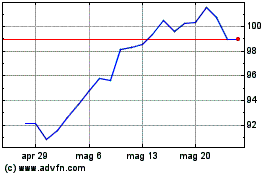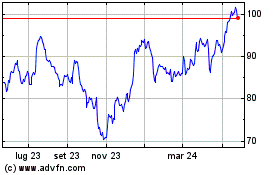- Majority of surveyed companies globally (85%) see
sustainability as a value creation opportunity
- High investment needs cited as top barrier to sustainability
efforts, making access to capital a key enabler
- Nearly 25% believe climate change is impacting their business
today, on par with risks like technological change and geopolitical
conflict
Corporates worldwide see sustainability primarily as a value
creation opportunity according to a new “Sustainable Signals”
report by the Morgan Stanley Institute for Sustainable Investing.
The survey polled over 300 private and public companies across
North America, Europe and APAC to understand how sustainability
factors into their businesses and where their organizations see the
greatest opportunities and challenges.
“Sustainability strategies and core business strategies are
converging, with companies increasingly seeing sustainability
factors as integral to the company’s long-term value creation,”
says Jessica Alsford, Chief Sustainability Officer at Morgan
Stanley and CEO of the Institute for Sustainable Investing. "There
may yet be challenges in developing expertise and financing models,
but corporate leaders view sustainable business practices as
fueling the creation of value as well as the mitigation of
risk.”
A majority of survey respondents (85%) see sustainability as a
value creation opportunity for their long-term corporate strategy,
and half of companies say it is a "very significant" reason for
pursuing a sustainability strategy. Other top motivations are
regulatory compliance and a company’s moral responsibilities.
Expectations from external stakeholders such as lenders and wider
civil society saw much lower response rates.
The top barrier deemed “very significant” to delivering on
sustainability efforts is the high level of required investment
(31%), followed by conflicts with the financial goals of the
company (28%) and macroeconomic uncertainty (25%). Overall,
investment needs ranked 1.5 times higher compared to other
barriers, such as lack of corporate leadership or employee
skills.
Key survey findings include:
- Financing Sustainability Strategies: Respondents
indicate that access to capital is vital, with 84% saying support
from investors is important to deliver their sustainability
strategies. 76% believe that sustainability measures could drive a
lower cost of equity and/or debt for their company over the next
five years. Only 42% say they are meeting or exceeding expectations
around aligning corporate financing with their sustainability
strategy.
- Integration of Sustainability into Business Decisions: A
majority of companies (55%) say their key business functions –
including capital expenditures, research and development, new
products and mergers and acquisitions – are subject to
sustainability criteria. However, just over one third agreed that
their company’s board has sustainability expertise. The most
commonly cited shortfall in board expertise is around
sustainability-related regulations (57%).
- Impact of Climate Change on Business: Nearly all
respondents (92%) expect climate change to impact their business
model by 2050, with 23% noting that it already has made an impact.
This puts climate on par with more traditional business risks
including technological change, competitor actions, geopolitical
conflict and supply chain instability.
The Sustainable Signals series was launched in 2015 and measures
the views of individual investors, institutional investors and
business on sustainable investing. The first survey of corporates
in the series, the new report is being released in conjunction with
Morgan Stanley’s 2024 Sustainable Finance Summit (May 21-22, New
York), an annual conference that brings together leaders across
sectors to discuss the latest trends in sustainable investing.
View the full results of the Sustainable Signals survey
here.
About Morgan Stanley Morgan Stanley (NYSE: MS) is a
leading global financial services firm providing a wide range of
investment banking, securities, wealth management and investment
management services. With offices in 42 countries, the Firm’s
employees serve clients worldwide including corporations,
governments, institutions and individuals. For further information
about Morgan Stanley, please visit www.morganstanley.com.
About Morgan Stanley Institute for Sustainable Investing
The Morgan Stanley Institute for Sustainable Investing (The
Institute) builds scalable finance solutions that seek to deliver
competitive financial returns while driving positive environmental
and social impact. The Institute creates innovative financial
products, thoughtful insights and capacity building programs that
help maximize capital to create a more sustainable future. For more
information about the Morgan Stanley Institute for Sustainable
Investing, visit www.morganstanley.com/sustainableinvesting.
Disclosures:
This material was published in May 2024 and has been prepared
for informational purposes only and is not a solicitation of any
offer to buy or sell any security or other financial instrument or
to participate in any trading strategy. This material was not
prepared by the Morgan Stanley Research Department and is not a
Research Report as defined under FINRA regulations. This material
does not provide individually tailored investment advice. It has
been prepared without regard to the individual financial
circumstances and objectives of persons who receive it.
Morgan Stanley Smith Barney LLC and Morgan Stanley & Co. LLC
(collectively, “Morgan Stanley”), Members SIPC, recommend that
recipients should determine, in consultation with their own
investment, legal, tax, regulatory and accounting advisors, the
economic risks and merits, as well as the legal, tax, regulatory
and accounting characteristics and consequences, of the transaction
or strategy referenced in any materials. The appropriateness of a
particular investment or strategy will depend on an investor’s
individual circumstances and objectives. Morgan Stanley, its
affiliates, employees and Morgan Stanley Financial Advisors do not
provide tax, accounting or legal advice. Individuals should consult
their tax advisor for matters involving taxation and tax planning,
and their attorney for matters involving legal matters.
Past performance is not a guarantee or indicative of future
performance. Historical data shown represents past performance and
does not guarantee comparable future results. Certain statements
herein may be “forward-looking statements” within the meaning of
the safe harbor provisions of the Private Securities Litigation
Reform Act of 1995. These statements are not historical facts or
statements of current conditions, but instead are based on
management’s current expectations and are subject to uncertainty
and changes in circumstances. These statements are not guarantees
of future results or occurrences and involve certain known and
unknown risks, uncertainties and assumptions that are difficult to
predict and are often beyond our control. In addition, this report
contains statements based on hypothetical scenarios and
assumptions, which may not occur or differ significantly from
actual events, and these statements should not necessarily be
viewed as being representative of current or actual risk or
forecasts of expected risk. Actual results and financial conditions
may differ materially from those included in these statements due
to a variety of factors. Any forward-looking statements made by or
on behalf of Morgan Stanley speak only as to the date they are
made, and Morgan Stanley does not undertake to update
forward-looking statements to reflect the impact of circumstances
or events that arise after the date the forward-looking statements
were made. Because of their narrow focus, sector investments tend
to be more volatile than investments that diversify across many
sectors and companies.
Certain portfolios may include investment holdings deemed
Environmental, Social and Governance (“ESG”) investments. For
reference, environmental (“E”) factors can include, but are not
limited to, climate change, pollution, waste, and how an issuer
protects and/ or conserves natural resources. Social (“S”) factors
can include, but not are not limited to, how an issuer manages its
relationships with individuals, such as its employees,
shareholders, and customers as well as its community. Governance
(“G”) factors can include, but are not limited to, how an issuer
operates, such as its leadership composition, pay and incentive
structures, internal controls, and the rights of equity and debt
holders. You should carefully review an investment product’s
prospectus or other offering documents, disclosures and/or
marketing material to learn more about how it incorporates ESG
factors into its investment strategy.
ESG investments may also be referred to as sustainable
investments, impact aware investments, socially responsible
investments or diversity, equity, and inclusion (“DEI”)
investments. It is important to understand there are inconsistent
ESG definitions and criteria within the industry, as well as
multiple ESG ratings providers that provide ESG ratings of the same
subject companies and/or securities that vary among the providers.
This is due to a current lack of consistent global reporting and
auditing standards as well as differences in definitions,
methodologies, processes, data sources and subjectivity among ESG
rating providers when determining a rating. Certain issuers of
investments including, but not limited to, separately managed
accounts (SMAs), mutual funds and exchange traded-funds (ETFs) may
have differing and inconsistent views concerning ESG criteria where
the ESG claims made in offering documents or other literature may
overstate ESG impact. Further, socially responsible norms vary by
region, and an issuer’s ESG practices or Morgan Stanley’s
assessment of an issuer’s ESG practices can change over time.
Portfolios that include investment holdings deemed ESG
investments or that employ ESG screening criteria as part of an
overall strategy may experience performance that is lower or higher
than a portfolio not employing such practices. Portfolios with ESG
restrictions and strategies as well as ESG investments may not be
able to take advantage of the same opportunities or market trends
as portfolios where ESG criteria is not applied. There is no
assurance that an ESG investing strategy or techniques employed
will be successful. Past performance is not a guarantee or a
dependable measure of future results. For risks related to a
specific fund, please refer to the fund’s prospectus or summary
prospectus.
Investment managers can have different approaches to ESG and can
offer strategies that differ from the strategies offered by other
investment managers with respect to the same theme or topic.
Additionally, when evaluating investments, an investment manager is
dependent upon information and data that may be incomplete,
inaccurate or unavailable, which could cause the manager to
incorrectly assess an investment’s ESG characteristics or
performance. Such data or information may be obtained through
voluntary or third-party reporting. Morgan Stanley does not verify
that such information and data is accurate and makes no
representation or warranty as to its accuracy, timeliness, or
completeness when evaluating an issuer. This can cause Morgan
Stanley to incorrectly assess an issuer’s business practices with
respect to its ESG practices. As a result, it is difficult to
compare ESG investment products.
The appropriateness of a particular ESG investment or strategy
will depend on an investor’s individual circumstances and
objectives. Principal value and return of an investment will
fluctuate with changes in market conditions.
© 2024 Morgan Stanley & Co. LLC and Morgan Stanley Smith
Barney LLC. Members SIPC. All rights reserved.
View source
version on businesswire.com: https://www.businesswire.com/news/home/20240520307646/en/
Media Relations: Carrie Hall Carrie.Hall@morganstanley.com
Grafico Azioni Morgan Stanley (NYSE:MS)
Storico
Da Mag 2024 a Giu 2024

Grafico Azioni Morgan Stanley (NYSE:MS)
Storico
Da Giu 2023 a Giu 2024
